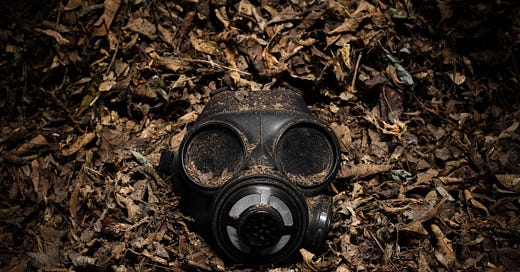“Let God arise, let his enemies be scattered: let them also that hate him flee before him. As smoke is driven away, so drive them away: as wax melteth before the fire, so let the wicked perish at the presence of God.”
Psalm 68
Last year, “shocking” photos were circulating throughout Western media of Russian Orthodox priests blessing tanks, missiles, rifles, and even nuclear bombs:
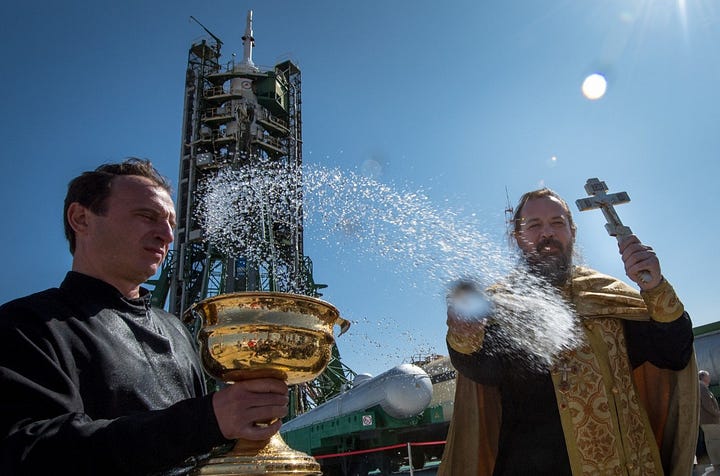
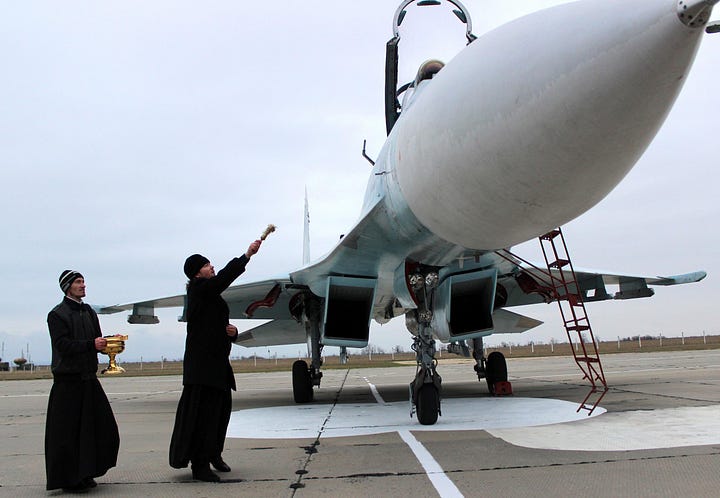
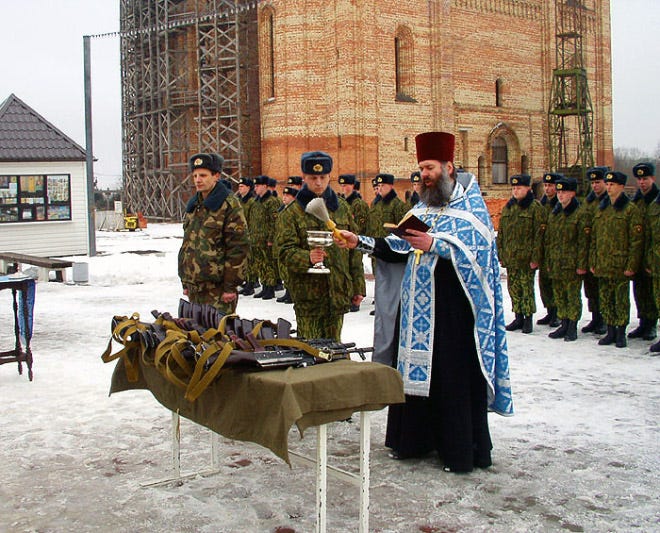
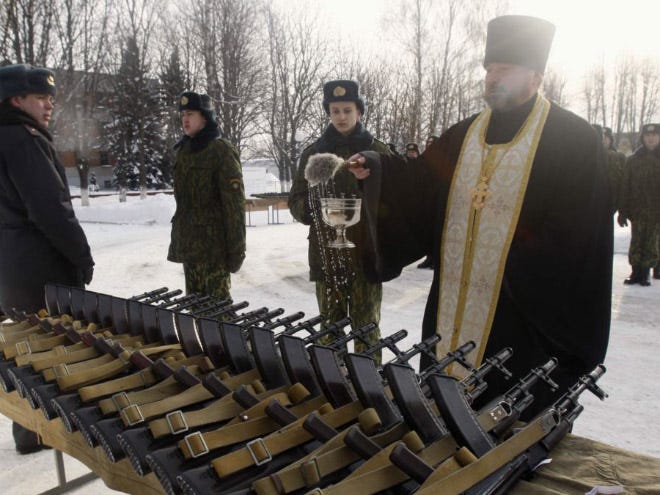
Though the accompanying news stories and editorials framed the matter in direct context of Russia’s war with Ukraine, many of the photos were much older, as is the practice itself.
What was particularly amusing in Western — and especially American — reactions to these stories was best summed up by an editorial cartoon depicting a Knight Templar in full armor, his hands gesturing in shock, stating that we must “crusade” against Russia to stop such barbaric misuses of religion.
One need not go so far back in history to find reason to suspect American outrage over those photos was only pearl- (or rosary…) clutching. The two army chaplains attached to the 509th Composite Bomb Group both reported (one proudly, one later with shame) that they’d blessed the atomic bombs and the men charged with dropping them on Hiroshima and Nagasaki. The group’s Catholic chaplain, Father George Zabelka (a man once reprimanded as a soldier for “excessive zeal”; that is, bloodlust) later famously expressed regret for his role and became a pacifist. No such about-face occurred for the group’s Protestant chaplain, Reverend William B. Downey. For the rest of his life, Downey gave multiple speeches, peppered with racial slurs against the Japanese and anti-communist fanaticism, praising the use of the atomic bombs and even, in a commemoration event, praying:
“We thank thee God for the atom bomb, through which peace came to our world…”
Of course, Christians were hardly alone in their fervent religious prayers and blessings for victory and conquest during World War II. Zen Buddhist monks blessed kamikaze pilots before their missions, and urged them toward śūnyatā and soku: empytness of the self and acceptance of one’s fate. Elsewhere within Christianity during that war, we find something quite peculiar: Protestant ministers and priests within Germany and Italy blessed their soldiers and prayed for victory, just as much as their counterparts in France, in Great Britain, in Canada, and in all the other opposing countries did.
That is: both sides called upon the Christian god for his help in defeating the “ungodly” other.
Much closer to the present, prayers for “the troops” are a quite common feature of American Protestant churches. In my adolescence, during the most fervent days of my former Christian faith and co-incidentally the invasion of Iraq named “Desert Storm,” I listened rapt to sermons detailing the one-god’s promises of victory over the faithless, the unbeliever, and any who would threaten his chosen.
Active duty and retired soldiers in the congregation were asked to wear their military uniforms during some worship services, so to receive blessings, anointing with oil, and then resounding applause. During one service, the “praise minister” led several thousand people in an improvised hymn. There was just one line to that song which we repeated over, and over, and over again, for what felt like ten minutes. After a few repetitions, the accompanying music increased in volume, and then also changed upward in key until, by the end, we were not so much singing but shouting the first line of Psalm 68:
“May God arise; may his enemies be scattered…”
We might also note the peculiar kind of patriotic religious art native to American Christianity, schlocky and often very poorly done, which saw its height during the invasion of Afghanistan and the second invasion of Iraq. For several years, I became quite a collector of such images, increasingly fascinated by its folksy and utterly haphazard collages of eagles, flags, crosses, soldiers, and (oft- misquoted and -misspelled) bible verses into devotional images, pastiche icons that the faithful could share through social media, affix to their cars, or frame in their kitchens:
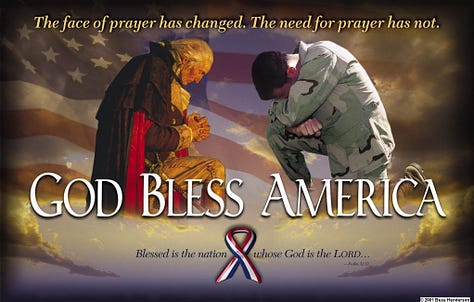
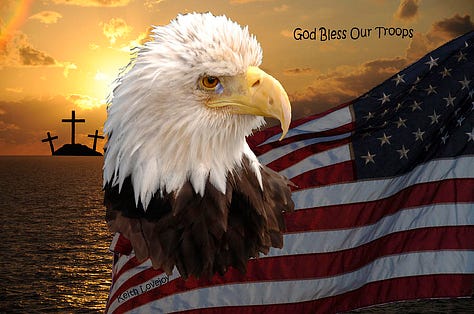
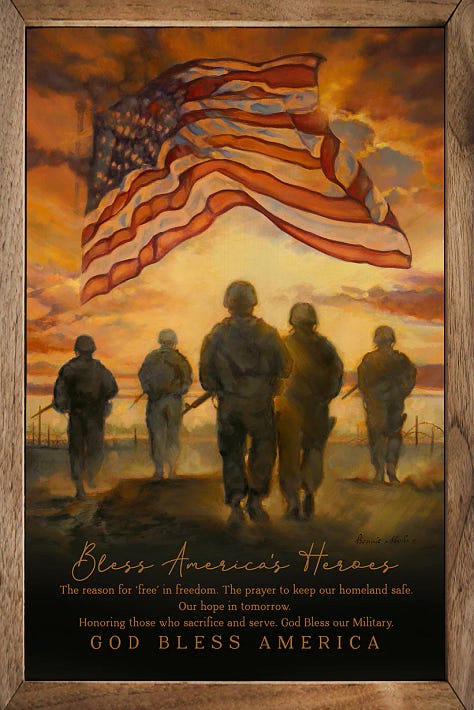
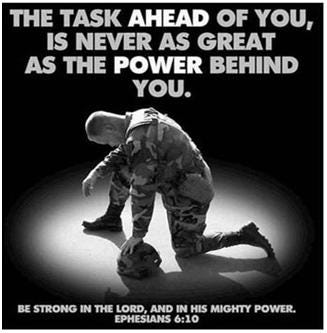
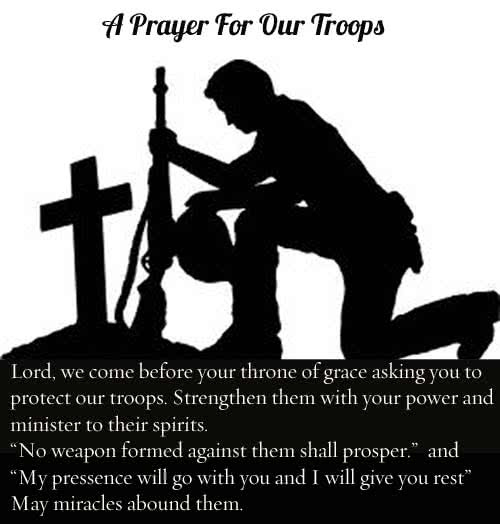
Times of war often lead to increased fervency and appeals to god, the virgin saints, gods, religious leaders, or other divine figures for protection and victory. Europeans particularly favored calling upon the virgin for her help. The Rosary prayer that Catholics pray now was enshrined into official church doctrine in 1569 by Pope Pius V. Two years later, that same pope urged all of Catholic Europe to pray it against the Ottoman Turks, so to protect Venice from the Muslims. Shrines and churches to the virgin were often built in Catholic cities to thank her or god for their help in war, just as some monuments (such as the Basilique Sacré-Cœur de Montmartre) were built to ask forgiveness from those same beings after defeats.
Also, at least concerning the appeal to divine powers in war, monotheists have absolutely had no monopoly over such practices. In both Greece and Rome, special processions, offerings, feast days, and new temples were all part of cultus to gods of war or tutelary gods of cities. Celtic and Germanic paganisms likewise solicited the help of gods for victory and protection, while blood sacrifices were a feature of ancient Hebrew, Sumerian, and much later Aztec civic religious appeals for conquest.
Thus, if any universal generalization can be made about religions, we might say that they seem generally to feature reliance on divine powers for protection from and victory over enemies.
Of course, there are also deeply pacifist religions (such as Jainism), and, in more modern times, we’ve seen pacifist strands within Catholic, Orthodox, and Protestant Christian sects. Many church leaders have increasingly urged less religious support for war. Last year, as reported by the Associated Press, Pope Francis:
“solemnly asked forgiveness that humanity had “forgotten the lessons learned from the tragedies of the last century, the sacrifice of the millions who fell in two World Wars.”
“Free us from war, protect our world from the menace of nuclear weapons,” he prayed.
Many Orthodox leaders have called for an end to the blessing of nuclear weapons, though not always for an end of weapon-blessing itself. Protestants leaders remain equally divided on these matters, with some fervently praying for the complete annihilation of enemies, and others arguing for much less violent means.
All this brings up several questions regarding contradicting Christian supplications. Does that god particularly favor certain sides, or certain nations, or certain military causes over others? When a devout Christian asks god for protection, and yet is killed by the bullet of another devout Christian, was it because they didn’t pray enough — or as much — as the one who killed them?
Such questions have obsessed Christian theologians for centuries, especially because they are related to an even larger theological question within monotheism, that of the “Problem of Evil.” Why would the Christian god allow massacres, genocides, and catastrophic deaths in the world when, according to everything the Christians believe about him, he is more than capable of preventing them?


